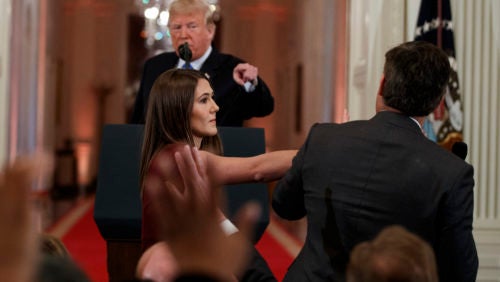Georgetown Law’s Institute for Constitutional Advocacy and Protection Files Amicus Brief on Behalf of Reporters Committee in CNN v. Trump
November 13, 2018

President Donald Trump looks on as a White House aide takes away a microphone from CNN journalist Jim Acosta during a news conference in the East Room of the White House, Wednesday, Nov. 7, 2018, in Washington. (AP Photo/Evan Vucci)
On the same day that CNN and Jim Acosta sued President Trump and White House officials for suspending Acosta’s press credentials following a November 7 press conference, Georgetown Law’s Institute for Constitutional Advocacy and Protection and the Reporters Committee for Freedom of the Press filed an amicus brief in support of the suit — asking the court to restore Acosta’s White House press credentials as quickly as possible.
On Friday, November 16, Judge Timothy J. Kelly of the U.S. District Court of the District of Columbia did so.
“Today, a major precedent was set for the future of a free press,” Georgetown Law’s ICAP tweeted. “It’s a win for [one] reporter, but most importantly a win for the Constitution & the enduring freedoms it grants us all.”
The amicus brief, filed in the U.S. District Court for the District of Columbia on November 13, asserted that the revocation of White House Correspondent Acosta’s press credentials violates the First Amendment’s guarantee of freedom of speech and of the press and that the move could have a chilling effect on other journalists.
“Questioning our elected representatives is at the heart of our Constitution’s First Amendment protections; the Amendment specifically guards ‘the freedom of speech [and] of the press,’” said Visiting Professor Joshua Geltzer, who serves as ICAP’s executive director. “Protecting and encouraging a wide range of views, including vigorously questioning and even criticizing the government, is what our founders expected when they wrote the Constitution. And courts have repeatedly stepped in to defend the rights of journalists to ask those questions in the course of their constitutionally protected newsgathering.”
Bruce Brown, executive director of the Reporters Committee for Freedom of the Press — a nonprofit association of reporters and editors dedicated to defending the First Amendment and the newsgathering rights of the media — called the president’s revocation of Acosta’s credentials “out of line.”
“It’s decidedly out of step with the traditions of freedom of speech and of the press enshrined in our Constitution, at the heart of our democracy, and long respected by presidential administrations of both parties, even in moments of great tension between the president and the press,” Brown said. He noted that the actions come against “a backdrop of crackdowns on press freedoms” occurring in countries including Austria, Hungary, Poland, and Turkey—“crackdowns characteristic of authoritarian governments that have contributed to degradations in democracy in the countries subjected to them.
“These disturbing trends underscore the importance of halting the Administration’s actions now, before they give rise to escalating suppression of a free and vibrant press,” he said.
The 17-page brief asserts that the move by the president against Acosta and CNN was retaliation which, absent judicial intervention, threatens the healthy functioning of our democracy:
“To dislike Acosta’s speech is President Trump’s prerogative; but to retaliate against Acosta and CNN for it by revoking his White House press credentials… tramples on the Constitution,” the brief states. “Such retaliatory action not only harms CNN and Mr. Acosta but also aims to chill the constitutionally protected speech of other journalists whom the public depends upon to question government officials vigorously and to report candidly on the responses.”
Legally Protected Right
At a press call following the filing, Geltzer said that the “facts of the case are clear.”
“Last week at a press conference, CNN’s White House Correspondent Jim Acosta asked…questions that clearly angered the president,” Geltzer said. “Hours later, Acosta’s press credentials were revoked.”
Courts have repeatedly stepped in to defend the right of journalists to ask questions in the course of their constitutionally protected newsgathering, Geltzer said. He and Brown discussed the 1977 D.C. Circuit case of Sherrill v. Knight (569 F.2d 124), in which a reporter was denied a press pass.
“Once you have a process in place to credential reporters, you can’t then turn around and deny or revoke a credential on a basis that’s completely arbitrary…or which punishes a particular reporter based on viewpoints or content,” Brown said.
A press credential, Brown noted, is a right that belongs to Acosta regardless of whether CNN can still gather news through other reporters. “It can’t be an answer to this case that individual reporters can be shown the door as long as the news organization itself continues to hold a pass because the individual reporters…[possess] these constitutional interests in their own right…the government should not be allowed to choose which individual reporters from news organizations ask them the questions…”
And the pair disputed the argument that the revocation was necessary to restore order.
“This was not something wildly out of bounds…,” Geltzer said. “Given the video that’s available to all of us, it strikes me as very hard for the government to suggest that here it was somehow enforcing decorum by hours later stripping this reporter of the security credentials that he uses to do his job.”
The two organizations teamed up voluntarily, the pair said. “We file probably 35 to 40 amicus briefs a year, and it’s great to be partnering with Georgetown here [for the first time] on a really terrific brief…” Brown said. “This is why the Reporters Committee exists.”
Geltzer and Brown discussed the case in an article on Medium.